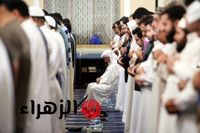As the third Sunday of Ramadan unfolded on March 23, 2025, many Muslims across Egypt were keenly interested in the prayer times for their region. The Islamic holy month emphasizes spiritual reflection and communal bonds, making the precise timing of prayers essential for the faithful to fulfill their religious obligations.
According to calculations made by the Egyptian National Institute of Astronomical Research, citizens in Menoufia Governorate would observe the Maghrib prayer at 6:05 PM after a total fasting period of 13 hours and 41 minutes. Knowing the times for Iftar—the breaking of the fast—is a significant part of daily life during Ramadan, with many eager to gather with family and friends as evening approaches.
In addition to Menoufia, the capital city, Cairo, offered similarly precise times for its residents. The schedule had Fajr (dawn prayer) at 4:30 AM, Dhuhr (noon prayer) at 12:02 PM, Asr (afternoon prayer) at 3:30 PM, Maghrib at 6:08 PM, and Isha (night prayer) at 7:25 PM. This structured timetable allows residents to harmonize their daily routines according to the prayer schedule.
Moving to the coastal city of Alexandria, the timings adjust slightly due to geographical differences. Here, Fajr is at 4:33 AM, while Maghrib is at 6:13 PM, among a few other noteworthy times for Dhuhr and Isha, reported accordingly. Adhering to these schedules is crucial for ensuring that prayers are performed collectively when possible, enhancing the sense of community.
In the eastern city of Ismailia, residents experienced Fajr at 4:25 AM and had their Maghrib prayer scheduled for 6:05 PM. Similarly, in Aswan, the timings began at 4:28 AM for Fajr, with Maghrib prayer also expected at 6:03 PM. Those in Hurghada noted even earlier times for Fajr, starting at 4:21 AM and Maghrib at a noticeably earlier time of 5:58 PM.
These variances in prayer times are all part of the different local calculations that reflect geographic location, thus making it crucial for communities to stay updated through local mosques and digital resources, ensuring accurate alignment with the Islamic calendar.
Such regular updates are vital not just for prayer but play a central role during Ramadan, a period filled with communal gatherings and spirituality. As communities organize Iftars and joint prayers, having the correct timings helps facilitate these events.
A unique challenge faced by residents is ensuring they take into account the different time zones and local adjustments. For example, while the national calculations provide a solid guideline, local variations can slightly alter exact timings, emphasizing the need for awareness.
Throughout Ramadan, many city officials and religious leaders stress the importance of prayer to foster unity among the Muslim community. As one official noted, "Prayer times are crucial for Muslims during Ramadan to observe their religious duties effectively." This sentiment echoes across the many gatherings held in homes and mosques during this special month.
There are also significant civil activities recorded on this day, such as the successful reclamation of 231 thousand square meters of agricultural land in Armant Center, as noted by officials celebrating this environmental and community enhancement initiative.
In summary, the organized prayer times across Egypt on March 23, 2025, showcase the depth of community planning and spiritual commitment during the Ramadan month. As Muslim families gather to fulfill their religious obligations, the importance of these schedules becomes more pronounced, ensuring they celebrate this holy month in communion, which is paramount to their faith and cultural heritage.







